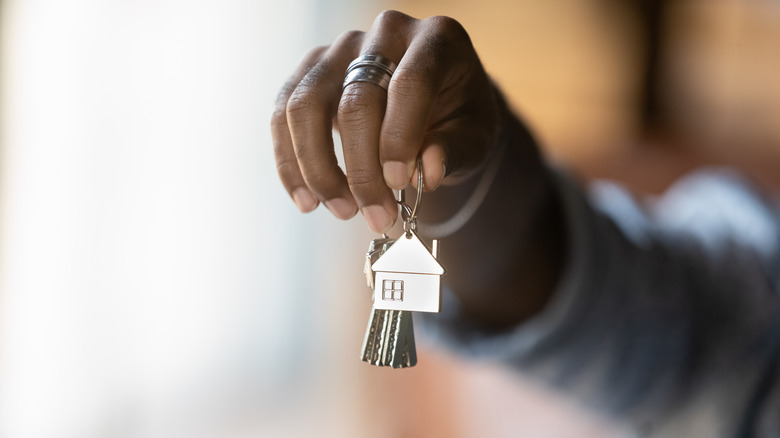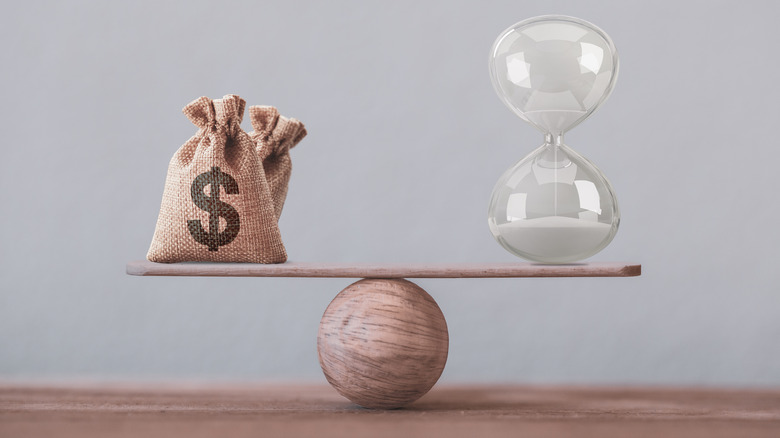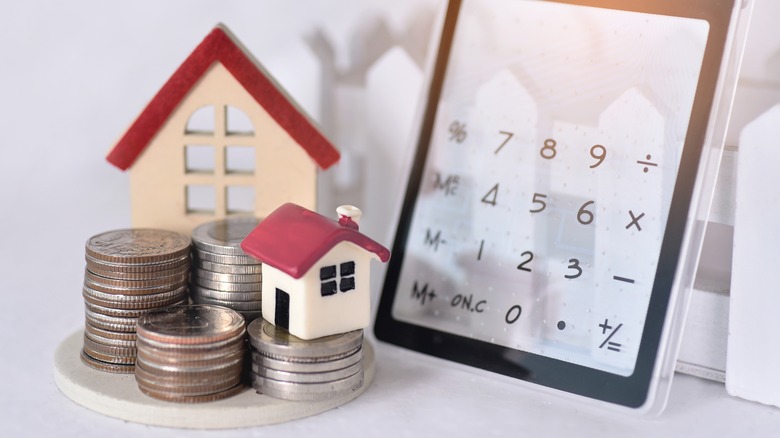Pros And Cons Of A Leasehold Property
A leasehold property is something that's common in European property markets, but less so in the United States. This doesn't mean that buyers can't find a leasehold in the U.S. marketplace. Koa Realty notes that Hawaii often sees these types of listings (along with fee simple); though, in all reality, a leasehold listing can be located anywhere.
A leasehold property owner is one that has purchased the building but not the land that it's sitting on. Leaseholds can offer a unique advantage to homeowners, but this can also come with some major drawbacks that you might want to shy away from while looking for a new place to call home.
The UK government notes that a leasehold property is legally owned by the buyer for a set period of time, after which the ownership reverts back to the freeholder, or landowner. This makes leasehold properties a kind of long-term rental that resembles a traditional tenancy agreement.
Where they differ is in the rights and responsibilities of the leaseholder. A buyer who enters into a leasehold agreement might take possession of the property for decades or even hundreds of years. Longer leases are often used by businesses rather than homeowners: The Guinness brewery in Dublin was famously leased for a period of 9,000 years by Arthur Guinness in 1759, according to the Guinness Storehouse (and for just £45 per year, really turning the tables on inflation!).
Purchasing a leasehold property can provide a great option, but this arrangement should always be considered carefully.
A leasehold doesn't build equity
The primary drawback of a leasehold property is that buyers who take advantage of these real estate assets won't build equity in the home and land, and can't utilize the asset for a future purchase as a result. When buying in the traditional marketplace, a buyer will begin to create equity in the property from the first mortgage payment (on top of the down payment, of course).
Eventually, a homeowner will likely look to move on to a new town, a larger or more luxurious home, or even to a smaller property that better suits specific lifestyle needs. Selling a home and moving allows for a jumpstart on the equity-building process in the new place (or a significant financial boost in terms of savings).
One of the main benefits of homeownership is the ability to create and retain equity value in a property, according to Investopedia. The financial value that property ownership provides can be leveraged in a number of ways, including a home equity loan or line of credit (see HELOC financing). As a leaseholder, you can take advantage of the property's physical benefits as if you were a traditional owner, but building equity does not come along as a part of the equation.
Leasehold purchases can make for profitable investment properties
While leaseholds won't provide growing equity value for a homeowner, a leasehold property can be a great asset for real estate investors. These long-term land lease arrangements are cheap in comparison to a traditional purchase and the ongoing cost of a leasehold is often minimal as well. This translates into a property that can be yours to control for a very long time at a low ongoing cost.
Realtor.com notes that many apartment buildings come as a leasehold, meaning the purchase of an apartment for the purposes of generating rental income might be formatted solely through this arrangement. A leasehold property makes a tradeoff for property investors that often works in the favor of the buyer. Instead of putting down a large sum of cash upfront for the home or apartment and then hoping to sell the asset at a later date to recoup what amounts to startup costs, a leasehold property dramatically reduces these expenses in return for a vacating of a traditional ownership situation.
However, as Realtor.com explains, a leasehold owner can sell their stake in the asset without the involvement of a property owner — unlike the process of subleasing an apartment, for instance. The arrangement is different in marked ways, but these changes typically benefit those looking to become landlords or expand their rental property holdings.
Ownership rights are greater than those in a traditional tenancy
Another important difference between a tenancy and leasehold arrangement is that leaseholders can treat the property as if they own it. A renting tenant cannot make structural changes to a landlord's property, but a leasehold buyer can and without the involvement of the landowner.
As Realtor.com notes, a leasehold buyer can construct totally new buildings on the property if they wish and then rent them out to others without permission from the landowner or any type of profit-sharing arrangement. The land is yours to do with what you wish as a leaseholder (better known as a "freeholder" in Britain, per Bankrate).
The ability to command the property without restriction is a major benefit to a leasehold buyer. This gives you options when it comes to altering a property for your needs. It's a particularly beneficial asset for business owners who are looking for property to use in their corporate endeavors or for a land buyer thinking of building a development of sorts to create rental income.
A lengthy leasehold of a century or longer can provide more than enough time to generate returns that far surpass the cost of the land and renovations to prepare it as a small set of apartments or a strip mall that will house a number of local businesses. Farming lands, beachside locations, and other specialized areas might also benefit from leasehold terms that give access to in-demand parcels at a reduced upfront cost.
Leasehold purchases require a much smaller down payment
The purchase of a leasehold requires a substantially smaller down payment than any other buying opportunity (via The Houston Chronicle). Smaller upfront costs mean that a buyer can get more for their money when it comes to selecting real estate. Buyers tend to create lists of must-haves and deal breakers, and making adjustments along the way and prioritizing features is simply a part of the shopping experience. With a leasehold property, buyers are able to retain more of their list of desires because the total cost of the asset comes at a reduced cost to make up for the fact that the buyer isn't receiving the same kind of ownership in return for their money as a traditional property buyer would.
This tradeoff is a great option for those trying to beat the massive overheating of the marketplace that the United States has seen in recent years (via Bankrate). Expanded purchasing power is a fantastic asset for buyers who are looking for a new property but may not need to consider the same equity concerns of others. Older buyers, for instance, who are moving out of a property that they've owned for years can take advantage of this alternative. Owning a property and continuing to create home equity might not matter for a retired person. Instead, finding a space that provides ample room for hobbies or a relaxing life while investing the additional profit from a home sale might be even more beneficial.
Leasehold properties may not make sense for most residential buyers
A leasehold property gives some immense benefits to certain types of buyers, but this arrangement won't be right for everyone. As an option, it exists for any type of buyer that might be able to take advantage, but it's essential to understand whether you are one of these people or not. Businesses can take particular advantage of a leasehold because they can write off much of the expense on annual tax filings (via The Houston Chronicle).
Likewise, businesses can operate on a threadbare real estate budget when using a traditional lease on a long-term leasehold instead of purchasing space for their enterprise. Buying land or an existing office building ties up essential financing in the land itself, and with the speculative and highly fluid nature of real estate assets, moving to a new property to facilitate brand expansion may not be feasible based on unavoidable marketplace factors that the business has no control over.
Similarly, older adults or those seeking to create real estate holdings that will produce rental income can benefit from the use of a leasehold because of the lower upfront costs that would otherwise eat away at savings or the proceeds from a previous real estate sale.
Capital protection is built into this arrangement if you leverage the opportunity correctly. For some, a leasehold is a perfect opportunity, but it must be approached with care.





